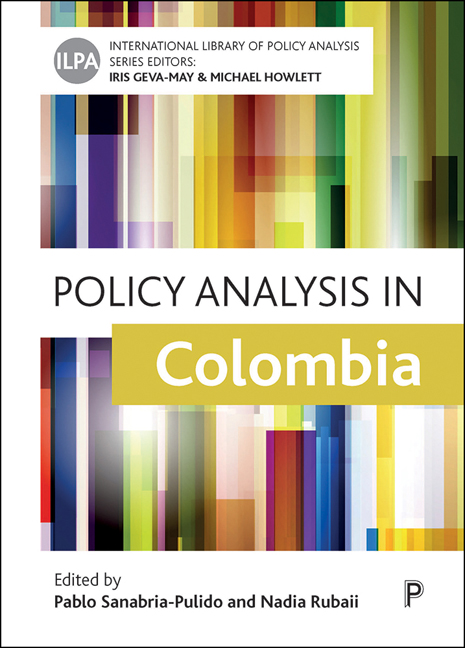Book contents
- Frontmatter
- Dedication
- Contents
- List of Figures and Tables
- List of Abbreviations
- Notes on Contributors
- Editors’ Introduction to the Series
- Policy Analysis in Colombia: An Introduction
- Part One Policy Analysis in Contemporary Colombia
- One The policy Analysis Movement in Colombia: The State of the Art
- Two Evolution of Policy Analysis as a Field of Study and Instruction in Colombia
- Three Policy Analysis, Bureaucratic Capacity and Public Administration Reforms in Colombia
- Part Two Policy Analysis within National and Subnational Governments
- Four Policy Analysis Inside Central Government in Colombia
- Five Policy Analysis and the Legislature in Colombia
- Six Policy Analysis in the Colombian Constitutional Court
- Seven Metropolitan Governance and Policy Analysis in Colombia
- Eight Policy Analysis for Decision Making in Colombian Local Governments
- Part Three Policy Analysis in Key Policy Domains
- Nine Policy Analysis in the Education Sector in Colombia
- Ten Policy Analysis in the Health Sector in Colombia
- Eleven Policy Analysis and Decision Making in the Military Forces: The Havana Experience
- Twelve Technocracy, Decision Making and Economic Policy in Colombia
- Thirteen Social Policy, Target Populations and Policy Analysis in Colombia
- Part Four Policy Analysis Beyond the State
- Fourteen Political Parties and Policy Analysis in Colombia
- Fifteen Policy Analysis and NGOs in Colombia
- Sixteen Media, Evidence and Policy Analysis in Colombia
- Conclusion: Building Capacity for Policy Analysis Amid Tensions and Challenges in Colombia
- Index
Three - Policy Analysis, Bureaucratic Capacity and Public Administration Reforms in Colombia
Published online by Cambridge University Press: 10 March 2021
- Frontmatter
- Dedication
- Contents
- List of Figures and Tables
- List of Abbreviations
- Notes on Contributors
- Editors’ Introduction to the Series
- Policy Analysis in Colombia: An Introduction
- Part One Policy Analysis in Contemporary Colombia
- One The policy Analysis Movement in Colombia: The State of the Art
- Two Evolution of Policy Analysis as a Field of Study and Instruction in Colombia
- Three Policy Analysis, Bureaucratic Capacity and Public Administration Reforms in Colombia
- Part Two Policy Analysis within National and Subnational Governments
- Four Policy Analysis Inside Central Government in Colombia
- Five Policy Analysis and the Legislature in Colombia
- Six Policy Analysis in the Colombian Constitutional Court
- Seven Metropolitan Governance and Policy Analysis in Colombia
- Eight Policy Analysis for Decision Making in Colombian Local Governments
- Part Three Policy Analysis in Key Policy Domains
- Nine Policy Analysis in the Education Sector in Colombia
- Ten Policy Analysis in the Health Sector in Colombia
- Eleven Policy Analysis and Decision Making in the Military Forces: The Havana Experience
- Twelve Technocracy, Decision Making and Economic Policy in Colombia
- Thirteen Social Policy, Target Populations and Policy Analysis in Colombia
- Part Four Policy Analysis Beyond the State
- Fourteen Political Parties and Policy Analysis in Colombia
- Fifteen Policy Analysis and NGOs in Colombia
- Sixteen Media, Evidence and Policy Analysis in Colombia
- Conclusion: Building Capacity for Policy Analysis Amid Tensions and Challenges in Colombia
- Index
Summary
Introduction
The Colombian government has undertaken numerous reforms in its public administration with the aim of enhancing bureaucratic capacity, effectiveness and efficiency (Younes, 2004; Restrepo, 2011). These reforms have taken place hand in hand with successive international public administration approaches, from the traditional Weberian approach to NPM, to the New Public Governance (as developed in Osborne, 2010). This chapter undertakes a policy analysis of administrative policies in Colombia in terms of both the design and characteristics of public administration reforms and the conditions for their implementation, in particular, the bureaucratic capacity of public organizations.
The design of administrative policies in Colombia historically has been based on the global North's approaches to public administration. Weberian approaches were influential in the 19th and 20th centuries, but NPM can be considered the main current approach in Colombian public administration. Some elements of New Public Governance can also be detected. The characteristics of these policies are identified in a timeline starting with the Constitution of 1991 and finishing in 2018.
On a second level of policy analysis, the implementation of these administrative policies has not been as expected. The chapter argues that one of the foremost conditions for implementation is bureaucratic capacity. It is still perceived that implementation of the administrative reforms has not been satisfactory, and that the bureaucratic capacity of public organizations tends to be low (Echebarría, 2006). Organizations with a high bureaucratic capacity constitute islands of excellence in Colombian public administration and have implemented the reforms in a more consistent and successful way, leading to better performance as measured in national indicators. Considering this, the purpose of this chapter is to analyze the different processes of administrative reform occurring in Colombia from 1991 to 2018, including implementation problems and main areas of progress, with an emphasis on the factors that determine high bureaucratic capacity in islands of excellence.
Thus, the chapter is divided into three sections. The first section presents a description of the public administration reforms implemented in Colombia since the 1990s. The second section is centered on the review of some of the difficulties in the implementation of such reforms, mainly related to bureaucratic capacity.
- Type
- Chapter
- Information
- Policy Analysis in Colombia , pp. 47 - 62Publisher: Bristol University PressPrint publication year: 2020



